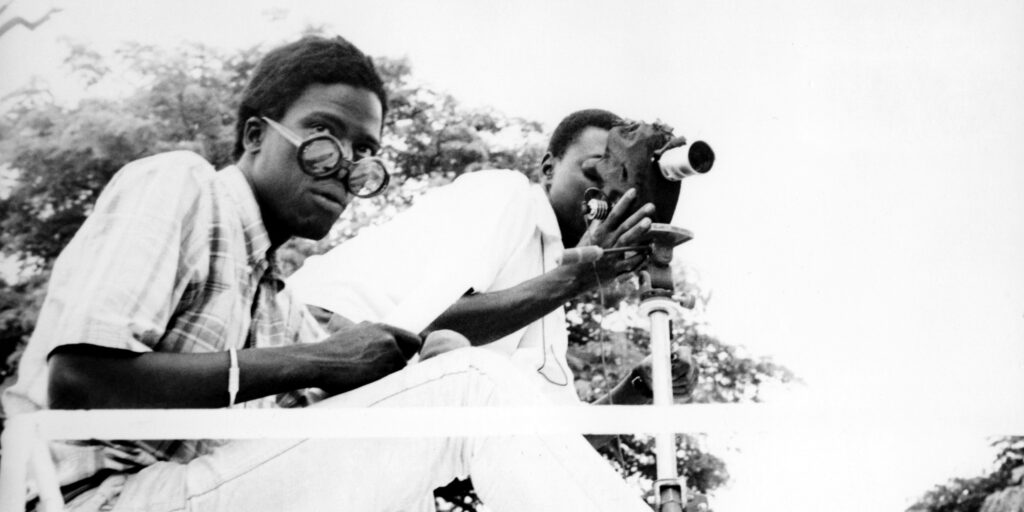CINEMALIBERO 2022

Curated by Cecilia Cenciarelli and Elena Correra
“Film history is a strange and largely unmapped land.” So wrote Peter von Bagh in his introduction to the first international screening of Kahdeksan surmanluotia, 40 years after its original broadcast. Thanks to him, Mikko Niskanen’s masterpiece crossed Finland’s borders and today stands alongside the works of von Stroheim and Zola. This year we can finally honour our promise to Peter to screen the film in a restored 35mm print.
We imagine this edition of Cinemalibero as a non-linear journey through films born on the margins and which urge us to reconsider the canon of film history. We have chosen to travel only on secondary roads, many of which lead to rural parts of the world, between the creases and among the scourges afflicting communities forgotten by those in power. From the centre of a Finland hollowed out by postwar agrarian policies, we follow the caravan of Thamp̄ to Thirunavaya, a village in Kerala, whose hardships and wonders are captured by Aravindan Govindan in a film that Satyajit Ray defined as “one of the most profound and moving portraits of travelling artists ever produced”. Victims of hostile nature and feudal remnants, Rocha’s peasants and shepherds struggle for survival in the Brazilian sertão. “Hunger is the very essence of our society,” the father of cinema novo later wrote. Black God, White Devil is a lyrically baroque film plunged in a tenebrous labyrinth of myths and superstitions. 12 years later, Felipe Cazals answers from the Mexican village of San Miguel de Canoa, with a powerful portrayal of an isolated and illiterate population at the mercy of tension and political repression. Having arrived in Dakar, we must give our eyes time to adjust to the light, to the skies of Colobane and its colours. And to the incendiary universe of Djibril Diop Mambéty. On the other hand, the German exile of the Turkish workman protagonist of Dar Ghorbat is grey, brown and neon-lit. Sohrab Shahid Saless, the pioneer of the Iranian new wave, makes us feel Husseyin’s loneliness and existential isolation to our very core. Finally, we present a premiere of a restoration very dear to us: Les Mains libres, directed by the Italian Ennio Lorenzini and produced by Casbah Film. The first film (shot in Technicolor!) produced by the newly independent Algeria, it has remained more or less invisible for over half a century and has now been rediscovered thanks to a collaboration with the Algerian artist Zineb Sedira, who currently represents France at this year’s Venice Biennale. We will show it back to back with Algérie en flammes, an equally essential to the history of Algeria and the anti-colonial struggle and certainly better known. The documentary, shot by René Vautier under exceptional conditions alongside the Algerian National Liberation Front during the war for independence, would first be screened in France only a decade later, during the Sorbonne occupation.
Cecilia Cenciarelli and Elena Correra
Program
Saturday 25/06/2022
16:00
Jolly Cinema
Contras’ City / BADOU BOY
Contras’ City / BADOU BOY
Cecilia Cenciarelli e Elena Correra
Sunday 26/06/2022
09:15
Auditorium DAMSLab
Case study: Restoring Aravindan Govindan’s Thamp̄
Case study: Restoring Aravindan Govindan’s Thamp̄
Sunday 26/06/2022
16:00
Jolly Cinema
THAMP̄
THAMP̄
Shivendra Singh Dungarpur
Tuesday 28/06/2022
09:00
Jolly Cinema
THAMP̄
THAMP̄
Tuesday 28/06/2022
16:30
Jolly Cinema
Algérie en flammes / LES MAINS LIBRES
Algérie en flammes / LES MAINS LIBRES
Moïra Chappedelaine-Vautier, Paola Scarnati (Aamod) e Zineb Sedira
Wednesday 29/06/2022
16:30
Jolly Cinema
DAR GHORBAT / IN DER FREMDE
DAR GHORBAT / IN DER FREMDE
Vivien Kristin Buchhorn (curator of Shahid Saless Archive)
Thursday 30/06/2022
09:00
Jolly Cinema
CANOA: MEMORIA DE UN HECHO VERGONZOSO
CANOA: MEMORIA DE UN HECHO VERGONZOSO
Kim Hendrickson (The Criterion Collection)
Thursday 30/06/2022
16:00
Jolly Cinema
DEUS E O DIABO NA TERRA DO SOL
DEUS E O DIABO NA TERRA DO SOL
Lino Mereiles (Metrópoles)
Saturday 02/07/2022
09:00
Jolly Cinema
DEUS E O DIABO NA TERRA DO SOL
DEUS E O DIABO NA TERRA DO SOL
Saturday 02/07/2022
16:00
Jolly Cinema
CANOA: MEMORIA DE UN HECHO VERGONZOSO
CANOA: MEMORIA DE UN HECHO VERGONZOSO
Daniela Michel (Morelia Film Festival)
Sunday 03/07/2022
14:00
Arlecchino Cinema
THAMP̄


